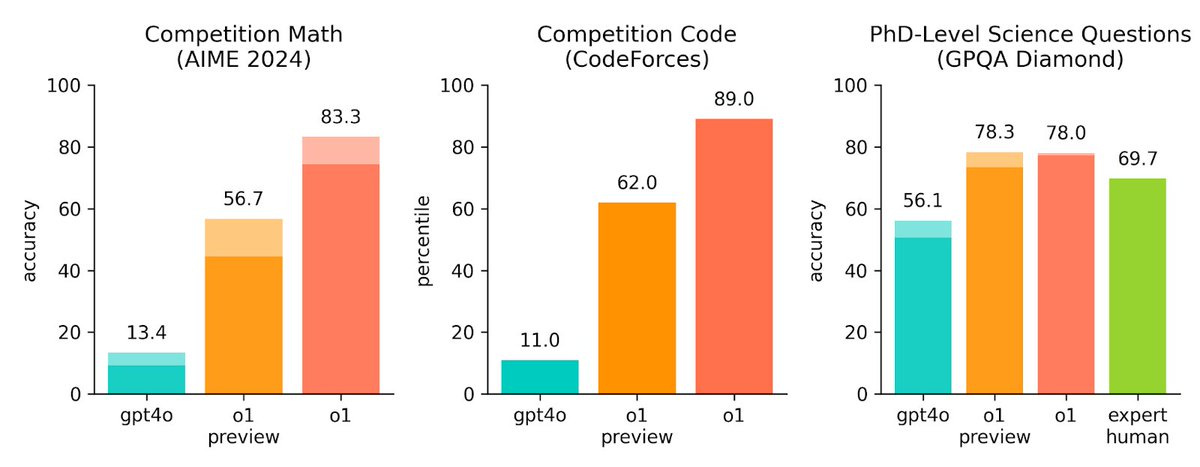OpenAI's Latest Launch: The o1 Model Series— A Paradigm Shift in AI?
The reaction to the o1 Model Series has ranged from kudos to criticism. It will take a few weeks before users decide, as ChatGPT and its variants are no longer the only option available.
OpenAI's Latest Innovation: The o1 Model Series
OpenAI, originally founded as a "not-for-profit" research organisation, has once again pushed the boundaries of artificial intelligence with the unveiling of its latest model series, the o1-preview. Launched on September 12, 2024, this new release marks a groundbreaking leap in AI capabilities, especially in complex reasoning and problem-solving tasks. OpenAI’s CEO, Sam Altman, heralded the o1 series as a transformative moment in the field, positioning it as a significant milestone that reflects the company’s relentless drive for innovation. With enhanced performance and refined intelligence, the o1-preview sets the stage for what could be the next era in AI technology.
Sam Altman's Announcement
Sam Altman, CEO of OpenAI, took to X (formerly Twitter) to announce the successful rollout of the o1 model series, stating, “Rollout complete; live to 100% of ChatGPT Plus/Team users now. You guys did incredible work; the performance-to-cost ratio is so good!” His message highlights the immense collaborative effort behind the development of the o1 series and underscores his strong confidence in the model's groundbreaking capabilities. Altman has set high expectations for this release, positioning the o1 series as the start of a new AI paradigm that promises to reshape the future of technology and innovation.
What Makes o1-preview Different?
The o1-preview model is a departure from the AI systems of the past. Unlike its predecessors, which primarily relied on pattern recognition for quick responses, the o1-preview is designed to simulate human cognition. This means the model "thinks" before responding, making it much closer to human reasoning processes. Some of the standout features of the model include:
Deep Problem Analysis: The model spends more time assessing the best approach to problems.
Refinement of Thought Process: It employs sophisticated problem-solving techniques.
Experimentation: It tests different strategies to arrive at better solutions.
Learning from Mistakes: The model improves over time by recognising and adjusting for errors.
These features allow the o1-preview to excel in fields requiring complex reasoning, such as science and mathematics. In one test, the model solved 83% of problems in the International Mathematics Olympiad, compared to the 13% achieved by its predecessor, GPT-4o.
Key Features and Performance
The o1 model series offers several standout features across various domains:
Enhanced Reasoning: Initial trials have shown the o1-preview to perform tasks at a level comparable to PhD students in fields like physics, chemistry, and biology.
Mathematical Capabilities: The model showcased its prowess in mathematics by scoring 83% on the International Mathematics Olympiad, a major improvement over GPT-4o's 13%.
Coding Expertise: In Codeforces programming competitions, the model performed in the 89th percentile, highlighting its potential to revolutionise software development.
The o1 Model Variants
OpenAI introduced two variants in the o1 model series:
o1-preview: The flagship model with advanced reasoning capabilities and a vast knowledge base, designed for more complex tasks.
o1-mini: A smaller, faster, and cost-effective model, particularly suited for coding tasks. The o1-mini is 80% cheaper than the o1-preview model, making it accessible for users with more constrained resources.
Availability and Access
Both the o1-preview and o1-mini models are accessible to different user groups:
ChatGPT Plus and Team Users: Both models are available via the model picker.
Developers with API Access: API Tier 5 users can prototype using both models, currently limited to 20 requests per minute (RPM).
Future Access: OpenAI plans to make the o1-mini model available to all ChatGPT Free users in the coming months.
Safety and Ethical Considerations
OpenAI has made safety a central feature in the development of the o1 series. Advanced reasoning allows these models to better follow established safety protocols, a critical feature given their powerful capabilities. In safety-related "jailbreak" tests, the o1-preview scored 84 out of 100, far surpassing the 22 out of 100 score of GPT-4o, demonstrating its robustness in maintaining ethical boundaries.
Criticisms and Concerns
Despite its impressive advancements, the o1 model series has not been without criticism. Several AI experts and ethicists have raised concerns about the increasing power and autonomy of these models. One major issue is the potential for AI to make decisions that are beyond human control or understanding, which could pose risks in sensitive applications like healthcare, security, or autonomous systems. Additionally, concerns around transparency persist; as models grow more complex, their decision-making processes can become opaque, making it harder to trace and explain how they arrived at certain conclusions. There's also apprehension about economic disruption, as more capable AI systems could replace human jobs in fields that traditionally required advanced problem-solving skills. Regulatory oversight and strict safety measures will be critical as these models evolve.
Market Disruption and Competition
The introduction of the o1-preview model may significantly disrupt industries reliant on data analysis and problem-solving. The new model’s capabilities challenge established AI leaders like Google, Microsoft, and Amazon. Furthermore, the competition in the AI field is intensifying, with companies like Anthropic launching competing models, such as Claude 3.5 Sonnet, which has been touted to surpass GPT-4o in certain domains. Google’s Gemini-1.5 Pro is another significant competitor, underscoring how quickly the AI landscape is changing.
OpenAI's Fundraising Initiative
Beyond the technological advancements, OpenAI is also making headlines with its ambitious fundraising goals. The company is reportedly seeking $6.5 billion in new funding, potentially bringing its valuation to $150 billion—an astonishing rise from its previous valuation of $80 billion just nine months ago. This demonstrates the immense economic potential AI holds for various sectors, from healthcare to finance, and signals OpenAI's growing influence in the global market.
India’s Position in the AI Revolution
India is uniquely positioned to capitalise on the AI revolution, thanks to its vast talent pool and growing digital infrastructure. However, to lead globally, India must take several key steps:
Investing in AI Education and Research: Building a strong pipeline of AI professionals is crucial.
Fostering Industry-Academia Collaboration: Strong ties between academic institutions and the private sector will accelerate innovation.
Developing India-Specific AI Solutions: AI applications tailored for sectors like agriculture, healthcare, and public services will ensure the country benefits from AI's transformative power.
Establishing a Regulatory Framework: Developing a balanced regulatory system will encourage innovation while safeguarding against risks.
Leveraging the Demographic Dividend: With a large youth population, India can position itself as a global AI talent hub by creating educational and employment opportunities in AI.
By following these strategies, India can position itself as a global leader in AI innovation, ensuring that it rides the AI wave rather than being left behind.
Summing Up and Looking Forward
The **o1-preview** model represents a watershed moment in the evolution of artificial intelligence, offering unprecedented capabilities that push the boundaries of what AI systems can achieve. However, this remarkable progress also underscores the urgent need for robust ethical guidelines and regulatory frameworks. As AI technology advances at breakneck speed, it is essential for governments, industries, and researchers to work collaboratively to ensure that its power is harnessed responsibly and for the common good.
The United Nations is set to release the report of its high-level working group on AI on 19th September, an event eagerly anticipated by stakeholders across sectors. This report is expected not only to shape the global discourse on AI regulation but could also serve as a template for ethical AI governance worldwide. With competition heating up on the global stage, it is crucial for countries like India to seize this moment and position themselves at the forefront of the AI revolution. By leveraging AI strategically, India can drive both economic growth and social progress, ensuring a transformative impact on its future.





